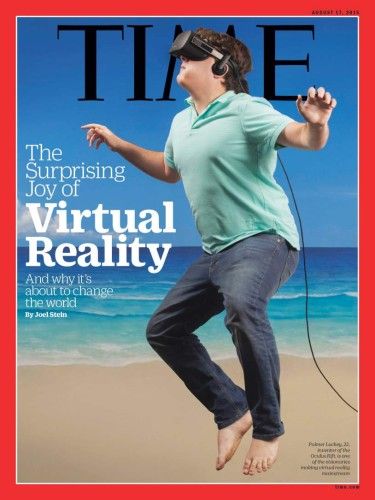
Who Is Palmer Luckey?
Palmer Luckey is the founder of Oculus, a subsidiary of Facebook, and the inventor of its main product, a virtual-reality headset known as the Oculus Rift. The Rift, which was released to the public this March, is probably the best-known and highest-profile VR headset, and arguably the piece of hardware that kicked off the current craze for virtual reality. And deservedly so: It was one of Kickstarter’s earliest and most visible successes, and the tech was so compelling that legendary video-game designer John Carmack left his company, iD, to become Oculus’s CTO.
So, Palmer Luckey is a tech-industry veteran with years of experience?
Absolutely not. Luckey, now 24, started developing the Oculus as a teenager. John Carmack described Oculus’s E3 2012 showing thusly: “This little shoe box that Palmer had taped together with two plastic lenses and a surplus screen was better than these super high-end displays that cost a hundred times as much.”
Two years later, noting the attention that Oculus had gotten on Kickstarter and from the gaming community, Facebook purchased the company for an astounding $2 billion, betting big on VR’s future. It also turned Luckey, who owned around a quarter of the company, into a multimillionaire. At the sale’s announcement, a vocal contingent of Kickstarter backers were livid, claiming that Luckey had sold out, losing his “started in a garage” street cred.
Ohhh, so he’s another one of these tech-bro rich kids?
Not … quite. He’s a much more interesting character than concurrent wunderkinds like Snapchat’s Evan Spiegel or Uber’s Travis Kalanick — less “bro” than, if we can use the term affectionately, dork. From Time’s 2015 profile of Luckey:
He was homeschooled, and though he did drop out of college, it was California State University, Long Beach, where he was majoring not in computer science but in journalism. He prefers shorts, and his feet are black because he doesn’t like wearing shoes, even outdoors. He doesn’t look like a guy who played Dungeons & Dragons so much as a character in Dungeons & Dragons. He’s a nerd from a different century, working on the problems of a different century. Palmer Luckey is a tinkerer.
Luckey now lives in the wealthy neighborhood of Atherton, near Facebook’s headquarters, with half a dozen or so friends on a property Luckey calls “The Commune.” They reportedly spend most of their time playing Super Smash Bros. and other games. Just to underline this: While Spiegel and Kalanick plot world domination from palatial estates and private jets, Palmer Luckey, who could buy dozens of properties, lives in a gamer commune with six roommates.
Time magazine … wasn’t that the one with the totally ridiculous cover?
You mean this one?

Why is Palmer Luckey back in the news?
Because he now has more money than sense or experience, Luckey threw some of his cash toward a nonprofit called Nimble America — a nonprofit, pro-Trump political organization that, according to its own literature, makes anti-Clinton memes. (To be clear: There is no hard evidence so far that Nimble America has made any memes or funded any trolls, though it exists, has money, and bought a billboard in Pittsburgh.)
Under the handle NimbleRichMan on Reddit, Luckey espoused the merits of a Trump presidency (many of the comments have since been deleted); he also attended a Trump rally in California last April.
Luckey’s involvement with Nimble America was reported out by the Daily Beast. “Money is not my issue,” he told the website. “I thought it sounded like a real jolly good time.”
Wait — so Luckey is the second Facebook-affiliated rich tech founder to throw his weight behind Trump this year?
Yes. You’re thinking of early Facebook investor and PayPal founder Peter Thiel, who’s pledged his support to Donald Trump. But where Thiel has thrown his weight behind more traditional rich-person political activities like speaking at the RNC and pledging to be a delegate (and, uh, crushing an independent media company?), Luckey has explicitly associated himself with Trump’s alt-right internet contingent — the one posting images of cartoon frogs dressed as Nazis and throwing the word cuck around.
Does that mean Luckey is a Gamergater?
Well, probably! His girlfriend, a cosplay model and gamer who goes by Nikki Moxxi, certainly is; she sometimes cosplays as the ill-defined ethics movement/harassment campaign’s mascot, Vivian James. She’s also a prolific pro-Trump tweeter, though since the Luckey revelation her Twitter and other social-media accounts are now deactivated.
Why would a dorky but clearly intelligent 24-year-old decide to take political action on behalf of an obviously terrible candidate, in such a bizarre fashion?
Why have 22-year-old gamers across the country decided to throw their weight behind an incoherently reactionary movement like Gamergate and a regressive racist candidate like Trump? You could spend a lifetime trying to articulate what it is about video-game culture in 2016 that has transformed its love of trolling and absence of empathy into an efficient incubator for far-right goonery. But the other part of it is that we don’t really know what, if anything, Luckey was trying to accomplish. Other than a billboard in Pittsburgh, it’s not clear what Nimble America has actually produced; Luckey has expressed less full-throated support of Trump than a kind of stilted excitement about stirring the pot. In a way, he exemplifies the central weirdness at the heart of Trump’s young and savvy alt-right support group. Is he doing it to actually help Trump? Is he just doing it for the lulz, like the old-school gamer trolls of 4chan? Is it some odd combination of both?
Has Facebook said anything?
Nope, and they likely won’t. Policing employee political actions is a bad move for any large corporation. Plus: Luckey already got his payday. What is firing him really going to do except give him more time to spend thousands of dollars on meme creation?





























